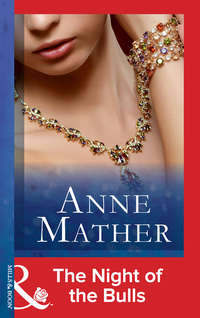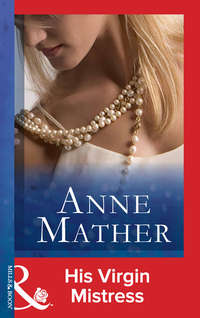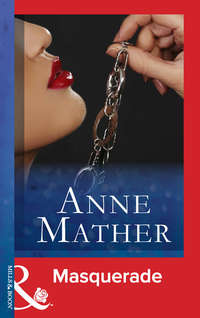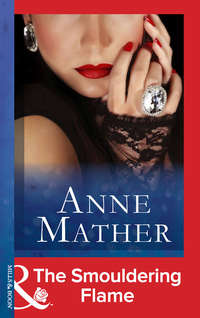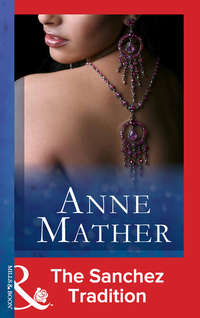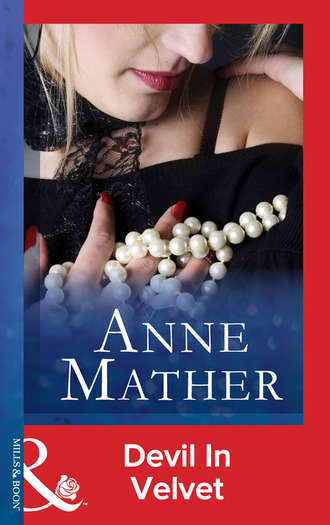
Полная версия
Devil In Velvet
A brisk rub down with the towel restored the glow of warmth to her skin, and she pulled on her pants and shirt again to run back to the house. She didn’t bother fastening them, she intended changing as soon as she got back, and she came into the house eagerly, intending to tell Susan what she had done.
The sight of André Laroche lounging by the sink, talking to Susan as she buttered the toasted remains of the loaf they had bought the previous afternoon, brought her up short, and she was glad of the wet towel to hide her embarrassment. She wondered uneasily which way he had come, and whether he had seen her in the stream. Would she have heard a footfall over the musical sounds of the water? The idea of his eyes observing her impromptu ablutions did not bear thinking about.
‘Good morning.’ He straightened, his greeting instinctively polite, but she sensed his probing regard and pressed the towel closer.
Harriet wondered if she was imagining the irony in his tones. ‘You’re early, monsieur,’ she countered, ignoring his remark, ‘it’s barely eight o’clock!’
‘Some of us have work to do,’ he replied smoothly. ‘Had you not been up, I should have had to come back later.’
‘Would you like some coffee, Monsieur Laroche?’
Susan’s words successfully forestalled any response her aunt was about to make, and Harriet took the opportunity to disappear into the small salon where they had left their suitcases. It took only a few moments to find a clean shirt and striped cotton pants, and she pushed her feet into her wedged sandals, glad of the extra height they provided. Although she was a tall girl, André could still top her by a few inches, but if she could decrease the disparity so much the better.
When she came back into the kitchen, her straight hair brushed and shining, she felt more able to deal with him, although she still felt slightly disarmed without any make-up. Susan had made the coffee and was presently pouring their visitor a cup, and Harriet waited impatiently for him to ask the question which must be foremost in his mind. But he didn’t. He acknowledged Harriet’s return with a casual quirk of his eyebrow, and then complimented Susan on her housewifely talents. The girl beamed beneath his deliberate flattery, and Harriet felt her teeth clenching so tightly together she was amazed they didn’t snap.
Susan handed her aunt some coffee, but Harriet declined the hastily proffered toast, refusing to answer the appeal in her niece’s eyes. In spite of all her practical reasoning of the night before, she was desperately tempted to tell him they were leaving.
‘Your niece has been telling me you are an expert on ceramics,’ he remarked suddenly, and Harriet flashed Susan an irate glance.
‘You know how children exaggerate,’ she retorted shortly, and ignoring Susan’s indignation, added: ‘I imagine you’d like to know what I’ve decided to do about the house.’
André put down his cup on the table. This morning he was wearing black denim jeans that hung on his hips and an olive green shirt that gave his dark-skinned features a sallow cast. As he turned slowly to face her, she conceived the absurd notion that he had been putting off asking for her decision, and the thought caused a momentary sapping of her will. Dear God, she thought weakly, he couldn’t want her to stay, could he?
‘You are leaving?’
It was more of a statement than a question, and Harriet was briefly diverted by Susan’s involuntary gasp of protest. Then she raised her eyes to his, and distractedly found herself refuting the charge.
‘I don’t have enough time to find another house and negotiate another sale,’ she defended herself tersely. ‘But naturally I expect you to provide the two beds you promised, and a cooking stove of some kind.’
‘Naturellement!’ It was perhaps a sign of his distraction that he spoke in his own language, and Harriet was forced to look away from the frank inquiry of his gaze. She was half angry with herself for agreeing to stay, and the inclination to blame him for this impossible situation was almost overwhelming. It was useless telling herself that he had been an innocent party to the affair. Childishly, she wanted a scapegoat, and who better than André Laroche?
Footsteps on the path outside provided an unexpected diversion, and Harriet looked up in surprise as a boy of perhaps fifteen or sixteen appeared in the open doorway. He was an attractive boy, tall for his age with shoulder-length dark hair and lean intelligent features. He paused in the aperture, his hands raised to support himself against the frame at either side, and his eyes flickered interestedly over the occupants of the room. Then he saw the man, and a grin spread over his face.
‘Te voilà!’ he exclaimed, with satisfaction. ‘Je t’ai cherché partout!’
Harriet knew at once who he was. The similarity was unmistakable, and besides, he had inherited his father’s eyes. He was completely unselfconscious standing there, curiosity deepening his regard.
André flexed his shoulder muscles rather impatiently, she felt, before looking at the boy without apparent affection. ‘This house no longer belongs to us, Paul,’ he declared curtly, in English. ‘And Louise could have told you where I was.’
Louise! Unwillingly Harriet was aware that she was holding her breath. Was Louise his wife’s name? Would he use his mother’s name to the boy?
‘Comment donc!’
Paul met the man’s eyes defiantly, and for a few seconds a silent battle of wills ensued. Then he looked away again, his attention passing over Susan’s flushed features to rest of Harriet’s withdrawn countenance.
‘Pardonnez-moi, mesdemoiselles!’ he apologised, without conviction, and she heard the sound of André’s angrily expelled breath.
‘This is my son—Paul,’ he stated, rather unnecessarily Harriet felt, but she chose to acknowledge the introduction, if only to thwart him.
‘Bonjour, Paul,’ she offered smoothly, and the boy surveyed her with added interest.
‘You must be Miss Ingram,’ he remarked slowly, and she was impressed by his effortless transition from French to English. ‘My father told us you had bought this place unseen.’ He stepped aside, ignoring André’s evident disapproval. ‘Have you decided to stay at Rochefort?’
‘Rochefort?’ Harriet frowned, recognising the name of the chateau. ‘Don’t you mean—Rochelac?’
Paul glanced mockingly at his father, and then shrugged his shoulders. ‘Probably,’ he affirmed indifferently. ‘Are you going to stay?’
‘That is not your concern,’ put in his father grimly, but Paul was not deterred.
‘I might be able to be of some assistance,’ he protested innocently, but Harriet could see his father was not deceived. Perhaps she ought not to be either, she thought shrewdly, and turning to André said:
‘Don’t let us keep you, monsieur. As you said, you have work to do.’
‘Very well.’ André cast his son another irritated look. ‘I will have the other items of furniture delivered later this morning.’
‘Thank you.’
Harriet’s lips moved in the polite semblance of a smile, but there was no warmth in it. Paul glanced from one to the other of them, and his eyes narrowed speculatively, but his father’s hand upon his shoulder propelled him towards the door.
‘If you have any other problems, don’t hesitate to get in touch with me,’ André added as they left, but it was not until they had gone that Harriet realised she did not even know where he lived.
As soon as they were alone, Susan rushed across the the room and hugged her aunt. ‘Thank you, thank you!’ she cried excitedly, but Harriet was in no mood to appreciate her gratitude.
‘Don’t thank me,’ she averred shortly. ‘We’re both going to have to work like slaves before we can begin to enjoy this holiday!’
At least hard labour served to put all thoughts of André Laroche out of her mind. With the aid of a wedge of wood and a hammer, she managed to get the upstairs window open, although shutting it again might prove a problem, and set Susan to scrubbing the bedroom floor. Meanwhile, she shifted everything out of the kitchen and set about cleaning the walls and cupboards. The salon would have to wait, but as they would not be spending much time in there, it wasn’t so important.
Outside, she discovered a shed adjoining the privy which contained some primitive gardening tools. Picking up a heavy scythe, she swung it experimentally through the air, and got quite a shock when a cluster of sunflower heads fell at her feet. It was sharper than she had imagined, and surveying the tangled garden she thought that perhaps it was just as well. But like the salon the garden would have to wait until another day.
Back in the kitchen, the air was stifling. Susan’s fire was still smouldering away, but Harriet was loath to put it out until the cooking stove arrived. They had not had a hot meal since yesterday lunchtime, and she was determined to fry some eggs and bacon today, on the fire if necessary. She was not keen to put her sleek, non-stick frying pan over the flames, but needs must, and Susan deserved something more substantial than bread and cheese.
By half past eleven, the kitchen was beginning to look presentable, although she needed some paint to colourwash the walls and ceiling. But at least it was clean, the table scrubbed and shining.
Upstairs, Susan had made a fair job of the bedroom, and together they tugged the old mattress downstairs and out into the garden. The frame took a little more dismantling, and they left the base for whoever brought the single beds to dispose of.
The sound of a lumbering vehicle making its way down the lane brought them both to the windows, and Harriet was relieved when she saw that it was a lorry loaded with furniture. Already the place was beginning to assume their identity, and had it not been for André, she thought she would have been content.
The driver of the vehicle introduced himself as Bertrand Madoc. He was a short, thick-set individual, with a shock of grey hair and twinkling button brown eyes. Harriet thought he was scarcely big enough to carry the bed-frame down from upstairs, but she was soon proved wrong. He was immensely strong, and made light work of shifting out the base and the old washstand.
‘I say,’ exclaimed Susan in dismay, ‘I’ve just cleaned that!’ but Bertrand just shook his head.
‘Attendez, mademoiselle!’ he told her reassuringly, and Susan unwillingly agreed to wait and see.
It soon became apparent that two single beds and a cooking stove were not all André had despatched. There was a small armoire and dressing table, beautifully carved, that Harriet recognised as being old and rather valuable; a pair of matching velvet chairs and a chaise-longue, somewhat faded, but obviously period pieces, and a nineteenth-century escritoire which when the dresser was removed did not look out of place in the small salon.
Bertrand would have carried the dresser out to the lorry, but Harriet stopped him, realising that it was exactly what she needed in the kitchen to store plates and dishes. She just wished she had had time to clean out the salon before the new pieces were installed, but it was too late now.
It was irritating having to feel gratitude towards André, but his kindness could not be denied. She wondered uncharitably whether this was his way of putting her in his debt, and then dismissed the notion by assuring herself that she had paid him adequately for the privilege of living here. Still, she couldn’t help wondering where he had got all these things from. Surely it would have been cheaper to buy new modern furniture than these period pieces, unless he had access to some mouldering chateau. Not for the first time she wondered what he had been doing at the St Germain salerooms that day eight years ago, and suddenly she realised why the name Rochelac had seemed so familiar. Among the articles for sale that day had been pieces from the Chateau de Rochefort! Of course! Why hadn’t she remembered this before? So what was André? Some sort of agent for the impoverished aristocracy?
Bertrand completed his task in less than an hour, refusing to accept Harriet’s offer of refreshment. Instead, he climbed back into his lorry, and she had to hurry to catch him before he closed the door of his cab. ‘Please,’ she exclaimed in his language, ‘thank—thank Monsieur Laroche for me.’
‘You will no doubt be able to thank him personally,’ Bertrand replied comfortably, and with a deprecating smile, reversed away.
Harriet walked back to the house speculating on his words. He sounded so sure about it. Did everyone know of André’s visits to the house? Did no one object? Well, she decided grimly, she did, and displayed an unsmiling acceptance in the face of Susan’s enthusiasm.
Still, she could not remain indifferent for long. The cooker, heated by Calor gas, was new and a gleaming oven invited-experimentation. The dresser, too, looked infinitely more attractive with plates on its shelves, and not even the gaps in the now-clean windows could detract the sun’s rays from shining through the panes that were there.
Harriet carried their cases upstairs, and Susan unpacked their clothes while she made up the beds. Although the headboards were of reproduction design, the bases were interior sprung, and with the sprigged cotton bedspreads Harriet had brought gave the room a bright appearance.
Susan soon disposed of the suitcases. Trousers, skirts and dresses hung away easily in the armoire, while their underclothes folded neatly into the drawers of the dressing table.
‘Oh, doesn’t it look nice!’ she exclaimed, when she had finished, the suitcases stowed away in a corner out of sight. ‘Surely you’re glad you stayed now, aren’t you?’
Harriet relented, putting an arm around the girl’s shoulders. ‘All right,’ she agreed. ‘You were right—this place does have possibilities.’
But after lunch it was too hot to do anything else. Susan put on her bikini and took a dip in the stream, and then stretched out on a rug, impervious to Harriet’s admonitions to watch out for ants.
Harriet herself carried the wooden rocker outdoors, and with the aid of a notebook and pencil, jotted down the items she thought they might need. But even that became too much of an effort after a while, and she allowed the pencil to fall from her hand and stretched out lazily. Not even a breeze stirred the trees in the lane, and the silence was broken only by the occasional sounds of birds and insects, and the soft babbling of the stream.
Unfortunately, with time on her hands, her thoughts turned irresistibly to André Laroche, and the amazing coincidence of his owning this house. Perhaps it was as well she had not probed more deeply into its history or she might never have come here at all.
Unwillingly, her mind drifted back to her first encounter with the man who was to have such a destructive influence on her life. Eight years ago, she had been eighteen and on her first buying trip with Charles Hockney in Paris. She had been thrilled at the experience of handling items which hitherto she had only read about, and their visits to the various salerooms had revealed a wealth of beauty and craftsmanship even to her uneducated eyes. Perhaps that was when she had first conceived her love of porcelain—when she held a pair of exquisite Mennecy figures in her hands, and learned to distinguish the marks of the Duc de Villeroy, the factory’s founder—or was it simply that afterwards she remembered every detail of that trip with an exactitude that far outweighed its importance?
Whatever the truth might be, she could still recall standing beside Charles at the back of the saleroom in the Place St Germain, watching the auctioneer at work. She had suddenly become aware that someone was watching her, and although Charles thought she was engrossed in the sale, she had turned her head and met the intent gaze of a man standing at the other side of the room. He was taller than many of the people there, lean and dark, with the kind of uneven features that are so much more attractive than bland good looks. Deep-set eyes, high cheekbones, a prominent nose, and a mouth that had a slightly cruel twist, she thought. She even remembered what he was wearing–a dark blue velvet suit and a matching silk shirt which on anyone else would have looked effeminate. Harriet had never encountered anyone like him before, and the way he was looking at her made her feel curiously weak inside, and just a little frightened. He wasn’t like the young men she was used to associating with, and he certainly wasn’t like Charles, who was plump and shortsighted, and inclined to baldness. She guessed this man was in his thirties, twenty years younger than Charles, with all the experience of a man who knows he is attractive to women.
Blind panic invaded her later when he made an excuse to speak to Charles—and through him to Harriet. But the panic had been unwarranted, she acknowledged now. He had been charming, fascinating, and so easy to talk to. He had asked her about her job and her ambitions, and how long she was staying in Paris, so that Harriet began to feel she really must be something special. She had left the saleroom in a state of euphoria which had only lasted as long as it took Charles to bring her down to earth again.
Then the following day he had telephoned her at the hotel, and she forgot Charles’ warnings and agreed to meet him for dinner that evening. Charles did not approve, but he could not forbid her to go, and even if he had, she thought she would probably have disobeyed him.
André took her to a restaurant in Montmartre, where they ate grilled lobster and Camembert, and Harriet drank more wine than she had ever done before. It crossed her mind that he might be trying to get her slightly drunk, but by then she was too bemused to do anything about it.
Конец ознакомительного фрагмента.
Текст предоставлен ООО «ЛитРес».
Прочитайте эту книгу целиком, купив полную легальную версию на ЛитРес.
Безопасно оплатить книгу можно банковской картой Visa, MasterCard, Maestro, со счета мобильного телефона, с платежного терминала, в салоне МТС или Связной, через PayPal, WebMoney, Яндекс.Деньги, QIWI Кошелек, бонусными картами или другим удобным Вам способом.


